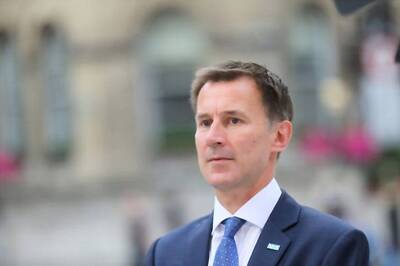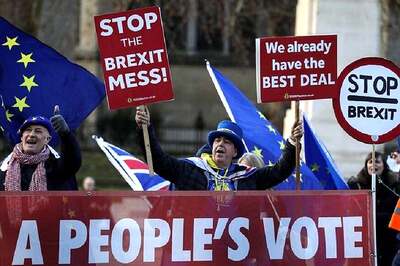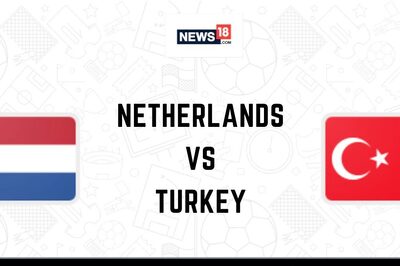
views
Washington: The House Intelligence Committee on Thursday released a declassified version of a whistleblower complaint about President Donald Trump’s effort to press the leader of Ukraine to launch an investigation into former Vice President Joe Biden, a leading contender for the 2020 Democratic presidential nomination.
It also released a letter from the intelligence community’s inspector general that investigated the complaint and found that it was credible and raised an urgent concern. These files, and the Trump administration’s efforts to block Congress and the public from seeing them, have led to heightened calls among Democrats to impeach Trump.
Here are takeaways from the newly disclosed files.
1. White House officials believed they had witnessed Trump abuse his power for personal political gain.
The White House officials who told me this information were deeply disturbed by what had transpired in the phone call. They told me that there was already a “discussion ongoing” with White House lawyers about how to treat the call because of the likelihood, in the officials’ retelling, that they had witnessed the President abuse his office for personal gain.
In a July 25 phone call with the Ukrainian president, Trump brought up U.S. aid to that country — without explicitly mentioning that he had just frozen a military aid package of hundreds of millions of dollars — and then pressed the Ukrainian leader as to investigate Biden. After that call, multiple White House officials told the whistleblower that they were concerned that Trump was abusing the power of the presidency “to solicit interference from a foreign country in the 2020 U.S. election.”
2. White House lawyers tried to hide the reconstructed call transcript — and had done so before.
In the days following the phone call, I learned from multiple U.S. officials that senior White House officials had intervened to “lock down” all records of the phone call, especially the official word-for-word transcript of the call that was produced — as is customary — by the White House Situation Room. This set of actions underscored to me that White House officials understood the gravity of what had transpired in the call.
The whistleblower writes that White House lawyers “directed” White House officials to remove records of the July 25 call from the system where such documents are normally stored and place it instead in a system for storing highly classified information, like files related to covert actions, even though it did not meet the criteria, in order to limit the number of officials who could see it. A White House official told the whistleblower that it was an “abuse” of that system to instead use it to hide politically sensitive information.
And in an appendix to the complaint, the whistleblower wrote that White House officials had said this was “not the first time” that a presidential transcript had been treated in that way, “solely for the purpose of protecting politically sensitive — rather than national security sensitive — information.”
The complaint does not name the White House lawyers. But they would certainly either work for or include the top attorney there — Trump’s White House counsel, Pat Cipollone.
3. The State Department saw Giuliani’s rogue outreach to Ukraine for Trump as a threat to national security.
Starting in mid-May, I heard from multiple U.S. officials that they were deeply concerned by what they viewed as Mr. Giuliani’s circumvention of national security decisionmaking processes to engage with Ukrainian officials and relay messages back and forth between Kyiv and the President. These officials also told me: that State Department officials, including Ambassadors Volker and Sondland, had spoken with Mr. Giuliani in an attempt to “contain the damage” to U.S. national security; ...
The whistleblower recounts the struggles by the senior U.S. diplomats to deal with the confusion created by the president dispatching his personal lawyer, Rudy Giuliani, to pressure Ukrainian officials to develop dirt against the Bidens, both in the run-up to the July 25 call and its aftermath. Multiple officials said that Ukrainian leadership was led to believe that any meeting or phone call between Trump and Ukraine’s new president would depend on whether the latter was willing to “play ball” on Giuliani’s demands.
4. Trump’s push for investigations coincided with a “sudden change of policy with respect to U.S. assistance for Ukraine.”
I learned from U.S. officials that, on or around 14 May, the President instructed Vice President Pence to cancel his planned travel to Ukraine to attend President Zelenskyy’ s inauguration on 20 May; Secretary of Energy Rick Perry led the delegation instead. According to these officials, it was also “made clear” to them that the President did not want to meet with Mr. Zelenskyy until he saw how Zelenskyy “chose to act” in office.
This is one of two manifestations of pressure on Ukraine by the Trump administration in advance of the July 25 call. The whistleblower cautioned that he or she did not know for certain whether this action was connected with the broader understanding that Trump wanted Zelenskiy to “play ball” on Giuliani’s demands. The whistleblower recounted the episode in a partly redacted appendix along with a discussion of Trump’s blocking of the military aid package Congress appropriated to help Ukraine defend itself from Russian aggression:
On 18 July, an Office of Management and Budget (OMB) official informed Departments and Agencies that the President “earlier that month” had issued instructions to suspend all U.S. security assistance to Ukraine. Neither OMB nor the NSC staff knew why this instruction had been issued. During interagency meetings on 23 July and 26 July, OMB officials again stated explicitly that the instruction to suspend this assistance had come directly from the President, but they still were unaware of a policy rationale. As of early August, I heard from U.S. officials that some Ukrainian officials were aware that U.S. aid might be in jeopardy, but I do not know how or when they learned of it.
The appearance that Trump was using foreign policy as leverage to pressure Ukraine into producing dirt on a political rival is at the heart of the calls to impeach him.
5. A widely criticized Ukrainian prosecutor piqued Trump’s and Giuliani’s interest by floating allegations to The Hill — but then backtracked.
In several public comments, Mr. Lutsenko also stated that he wished to communicate directly with Attorney General Barr on these matters. The allegations by Mr. Lutsenko came on the eve of the first round of Ukraine’s presidential election on 31 March. By that time, Mr. Lutsenko’s political patron, President Poroshenko, was trailing Mr. Zelenskyy in the polls and appeared likely to be defeated. Mr. Zelenskyy had made known his desire to replace Mr. Lutsenko as Prosecutor General. On 21 April, Mr. Poroshenko lost the runoff to Mr. Zelenskyy by a landslide.
The whistleblower traces Trump’s July 25 call back to claims put forward by a former top Ukrainian prosecutor, Yuriy Lutsenko, and his allies to a conservative opinion contributor for The Hill, John Solomon, in the spring of 2019. Solomon is known for writing investigative-style pieces that foster a narrative that Trump’s enemies are up to nefarious misdeeds, which are often then amplified by Fox News host Sean Hannity.
In a video interview and several articles, Solomon floated a number of claims by Lutsenko, including that Ukrainian officials had illegally colluded with Democrats to interfere in the 2016 presidential election to help Hillary Clinton, purportedly by leaking financial records that prompted the resignation of Trump’s campaign chairman, Paul Manafort. Solomon also amplified Lutsenko’s assertion that the Obama-appointed ambassador to Ukraine, a longtime career diplomat, had given Lutsenko a “do not prosecute list.” A third claim that Solomon put forth was Lutsenko’s allegation that Biden had pushed to fire a previous top Ukrainian prosecutor, Victor Shokin, in order to quash a purported criminal investigation into a Ukrainian company on whose board his son Hunter Biden sat.
In fact, the Obama administration, Western supporters of Ukraine and anti-corruption activists all wanted Shokin out because he was widely seen an obstacle to reform and refused to bring corruption cases. The State Department called Lutsenko’s claim about a do-not-prosecute list “an outright fabrication,” and in May Lutsenko walked back his allegations about the Bidens, stating that there was no evidence they had done anything wrong.
Lutsenko, who succeeded Shokin, was initially seen as a better prosecutor, but his image tarnished over time. The whistleblower complaint noted that “Mr. Lutsenko has no legal training and has been widely criticized in Ukraine for politicizing criminal probes and using his tenure as Prosecutor General to protect corrupt Ukrainian officials.” But Trump and Giuliani remained intent on investigating what he had told Solomon. The State Department has since recalled the ambassador, and in the July 25 phone call, Trump was apparently referring to Lutsenko when he told the Ukrainian president that, “I heard you had a prosecutor who was very good, and he was shut down, and that’s really unfair.”
On Thursday, Solomon defended his work, tweeting, “I stand by my stories 100%.”
6. The whistleblower raised concerns about Barr’s involvement.
In the course of my official duties, I have received information from multiple U.S. Government officials that the President of the United States is using the power of his office to solicit interference from a foreign country in the 2020 U.S. election. This interference includes, among other things, pressuring a foreign country to investigate one of the President’s main domestic political rivals. The President’s personal lawyer, Mr. Rudolph Giuliani, is a central figure in this effort. Attorney General Barr appears to be involved as well.
In the complaint, the whistleblower said he had heard from other officials that Trump, in his July 25 call, urged the Ukrainian president to work with Attorney General William Barr in investigating the Bidens.
This was accurate, according to a reconstructed transcript of the call made public Wednesday; among other things, it says that Trump told the Ukrainian president, “There’s a of talk about Biden’s son, that Biden stopped the prosecution and a lot of people want to find out about that so whatever you can do with the Attorney General would be great. Biden went around bragging that he stopped the prosecution so if you can look into it ...”
And after Zelenskiy promised to have his new top prosecutor open the investigations that Trump was demanding and asked if the United States had any information it could share for that purpose, Trump thanked him and said, “I will tell Rudy and Attorney General Barr to call.”
A senior Justice Department official said this week that the White House had not directed Barr to investigate the Bidens but would not say whether there was any such investigation.
7. The inspector general kept the whistleblower’s identity secret.
The Complainant’s identity is known to me. As allowed by law, however, the Complainant has requested that the ICIG not disclose the Complainant’s identity at this time. For your information, the Complainant has retained an attorney, identified the attorney to the ICIG, and requested that the attorney be the Complainant’s point of contact in subsequent communications with the congressional intelligence committees on this matter.
This passage, which comes from the letter by Michael Atkinson, inspector general for the intelligence community, shows he withheld the identity of the whistleblower when transmitting the complaint to Joseph Maguire, the acting director of national intelligence, with the expectation that Maguire would then send it to Congress under a whistleblower law. Maguire and the Trump administration initially refused to do so, although they relented this week. Maguire testified Thursday that he still does not know the identity of the whistleblower.
8. The inspector general flagged mitigating information, but concluded the complaint was urgent and credible.
The Complainant’s Letter acknowledges that the Complainant was not a direct witness to the President’s telephone call with the Ukrainian President on July 25, 2019. Other information obtained during the ICIG’s preliminary review, however, supports the Complainant’s allegation that, among other things, during the call the President “sought to pressure the Ukrainian leader to take actions to help the President’s 2020 reelection bid.” Further, although the ICIG’s preliminary review identified some indicia of an arguable political bias on the part of the Complainant in favor of a rival political candidate, such evidence did not change my determination that the complaint relating to the urgent concern “appears credible,” particularly given the other information the ICIG obtained during its preliminary review.
This passage, also from Atkinson’s letter, acknowledges that the whistleblower did not have direct knowledge of the July 25 call and suggests that the whistleblower may not support Trump politically. But Atkinson, a Trump appointee, nevertheless concluded after a preliminary investigation that the information the whistleblower put forward was credible and raised an urgent concern that Congress needed to see.
Charlie Savage c.2019 The New York Times Company




















Comments
0 comment